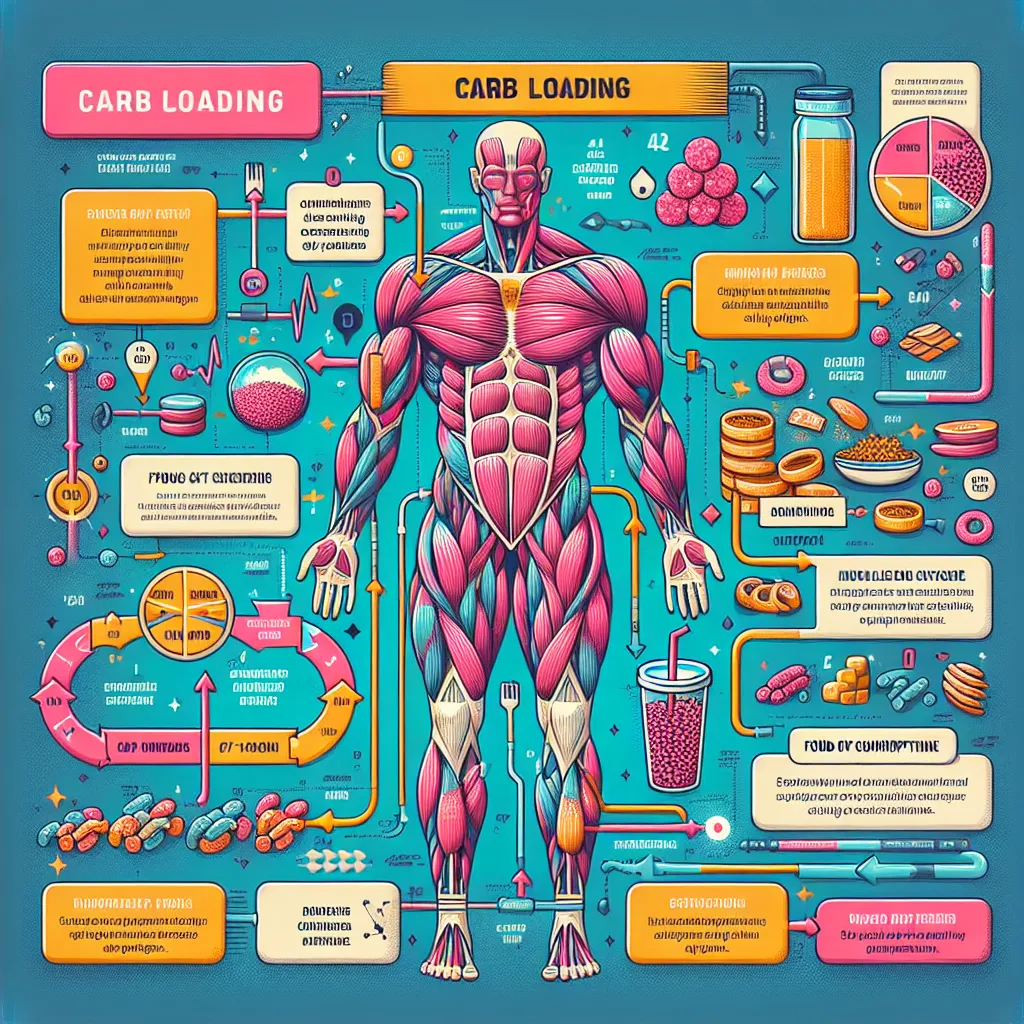‘Carb loading’ is a crucial term in the world of sports nutrition and endurance athletics. Let’s break it down:
Definition: Carb loading, short for carbohydrate loading, is a strategy used by athletes to maximize the storage of glycogen (energy) in the muscles and liver before a major endurance event.
Part of Speech: Noun (can also be used as a verb in its gerund form)
Pronunciation: /kɑːb ˈləʊdɪŋ/

Context and Usage of ‘Carb Loading’
Examples in Context
-
“Carb loading is essential for marathon runners to ensure they have enough energy to complete the race.”
Analysis: This sentence demonstrates the primary purpose of carb loading in endurance sports. -
“The triathlete began her carb loading regimen three days before the Ironman competition.”
Analysis: Here, we see the term used to describe the process as a planned strategy with a specific timeframe. -
“Nutritionists debate the most effective carb loading techniques for different types of athletes.”
Analysis: This example shows that carb loading is a subject of scientific study and professional discussion. -
“Inexperienced runners often mistake carb loading for simply eating a large pasta dinner the night before a race.”
Analysis: This sentence highlights a common misconception about carb loading, emphasizing that it’s a more complex process than just one meal. -
“The cyclist’s performance improved significantly after incorporating proper carb loading into his pre-race routine.”
Analysis: This example illustrates the positive impact of carb loading on athletic performance.
Common Contexts
‘Carb loading’ is most frequently encountered in:
- Endurance sports discussions (marathons, triathlons, cycling)
- Sports nutrition literature
- Fitness and training blogs
- Scientific research on athletic performance
Frequency in IELTS
In IELTS exams, ‘carb loading’ may appear in:
- Reading passages about sports science or nutrition (Academic module)
- Listening sections discussing athletic training or dietary advice
- Speaking tasks related to health, fitness, or sports
- Writing Task 2 essays on topics of health, sports, or nutrition
While not extremely common, understanding this term can be beneficial for test-takers, especially those interested in sports or nutrition.
Vocabulary Analysis
Word Structure
‘Carb loading’ is a compound term:
- ‘Carb’ is an abbreviation of ‘carbohydrate’
- ‘Loading’ comes from the verb ‘to load’, meaning to fill or supply abundantly
Synonyms and Related Terms
-
Glycogen loading
- Definition: The process of increasing glycogen stores in muscles
- Part of Speech: Noun
- Pronunciation: /ˈɡlaɪkədʒən ˈləʊdɪŋ/
-
Carbohydrate supercompensation
- Definition: A scientific term for the process of maximizing muscle glycogen stores
- Part of Speech: Noun
- Pronunciation: /ˌkɑːbəʊˈhaɪdreɪt ˌsuːpəˌkɒmpənˈseɪʃən/
-
Pasta party
- Definition: A colloquial term for the pre-race meal, often involving high-carbohydrate foods
- Part of Speech: Noun
- Pronunciation: /ˈpæstə ˈpɑːti/
Memorization Techniques
Mind Map
Create a mind map with ‘Carb Loading’ at the center, branching out to related concepts:
- Types of carbohydrates (complex, simple)
- Endurance sports (marathon, triathlon, cycling)
- Timing (days before event, meal planning)
- Benefits (increased energy, improved performance)
- Potential risks (bloating, digestive issues)
Storytelling Technique
Imagine a marathon runner named Sarah:
“Sarah knew her carb loading strategy was crucial. Three days before the big race, she began increasing her pasta and rice intake. By race day, her muscles were fully stocked with glycogen, ready to power her through all 26.2 miles.”
Practice Exercises
-
Fill in the blank:
“The triathlete’s plan included eating more bread and potatoes in the days leading up to the event.” -
Write a paragraph about preparing for a long-distance cycling event, using ‘carb loading’ and at least two related terms.
-
IELTS Speaking Practice:
Describe a time when you or someone you know prepared for a major physical challenge. How did they alter their diet? -
IELTS Writing Task 2 Practice:
Some people believe that special diets and eating habits are crucial for athletic performance, while others think natural eating is sufficient. Discuss both views and give your opinion.
Conclusion
Understanding ‘carb loading’ not only enhances your IELTS vocabulary but also provides insight into sports nutrition. Remember to practice using this term in context, especially if you’re interested in health and fitness topics.
We encourage you to share your experiences with learning this term or ask any questions in the comments section below. How might you use ‘carb loading’ in your next IELTS practice session?
For more information on nutrition and its impact on athletic performance, check out our article on glycogen stores. If you’re interested in endurance training, our guide on half-marathon training might be helpful.